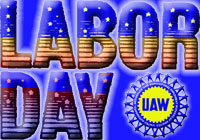

 |
 |
|||||||
|
|
Labor Day 2003: The Struggle Continues All across the nation on September 01, 2003, people will be celebrating Labor Day. In hundreds of locations there will be gatherings to commemorate the event. However, millions more are at home and have no idea what the day really means. They simply look on the day as one last summer bash before fall sets in. Brother and sisters I tell you today, that this day means much more than this. Labor Day was established due to the hard work and persistence of a group people who wanted the contributions of America’s workers recognized. Winning the observance of Labor Day was just as difficult as the other trials that America’s workers faced over 100 years ago. Following the Civil War, America began to industrialize. Factories began to spring up, as the demand for goods grew. The country began to expand west, as millions of immigrants began to fill ships in passage to the US from the western world. Irish, Scottish, German, French and Chinese made their way to the new world, boosting the need to manufacture goods. However, these immigrants found their dreams of the new world to not be as wonderful as they imagined. Living quarters were usually cramped, as families would often live several to a single dwelling home. Usually the entire family worked with men, women and children, often putting in twelve-hour days in a factory. They worked tired and sick often, because if you missed a say you would be fired. The growing population demanded goods, and the manufacturers where forced to supply. In 1869, 17 year Irish immigrant Peter McGuire began an apprenticeship in a piano shop in New York City. This job was better than his others, for he was learning a trade, but he still worked long hours with low pay. The working conditions and low pay was causing the workers of New York to become increasingly disgruntled with the situation. In the spring of 1872, Peter McGuire and 100,000 workers went on strike and marched through the streets, demanding a decrease in the long working day. This event convinced Peter that an organized labor movement was important for the future of workers' rights. He spent the next year speaking to crowds of workers and unemployed people, lobbying the city government for jobs and relief money. It was not an easy road for Peter McGuire. He became known as a "disturber of the public peace,” traveling up and down the east coast to speak to laborers about unionizing. The idea of organizing workers according to their trades spread around the country. Factory workers, dockworkers and toolmakers all began to demand and get their rights to an eight-hour workday, a secure job and a future in their trades. Peter McGuire and laborers in other cities planned a holiday for workers on the first Monday in September, halfway between Independence Day and Thanksgiving Day. On September 5, 1882 the first Labor Day
parade was held in New York City. Twenty thousand workers marched in
a parade up Broadway. They carried banners that read We stand here today, 121 years after that first Labor Day parade in New York City, and we can know the benefits of being union members. These include: - Union members earn 26 percent more than
their nonunion counterparts. These are great gains and we all should
thank those who have come before for their part in establishing these
worker’s rights. Union households know the difference that holding
that union card can make. However, the number of those households continues
to decline. More than 42 million nonunion workers say they want to join a union. However, employers often harass and intimidate workers when they join together to form their union. That is wrong, often illegal and most definitely a violation of the human rights of those workers. Independent research shows that: - 25 percent of employers illegally fire
at least one worker for union activity during organizing campaigns. So, while companies deny workers the right to organize, they are busy shipping jobs out of the country. The introduction of NAFTA in 1994 has resulted in the loss of 3 million actual jobs in this country. NAFTA hurt Mexico’s workers as well. While the number of people employed in Mexico’s maquiladoras grew by 800,000 with the introduction of NAFTA, real Mexican wages fell by 20% with poverty growing. To add insult to injury, the passing of permanent trade relations with China has added to our misery. In 2002, the US bought $5 worth of goods for every $1 they sold to China. That resulted in an $83 billion trade deficit with China alone. For the year, the US saw a trade deficit of more than $450 billion or $1.2 billion a day. Our trade deficit is 16 times larger than it was 20 years ago. Europe’s trade deficit is only 1/10 of ours, and Japan has a trade surplus. If this wasn’t bad enough, you add a Congress, Senate and White House that continually push anti-worker legislation and the disaster only gets worse. There have been 3.2 million private-sector jobs loss since George Bush took the oath as President in 2000. That equals more than 110,000 jobs a month. The jobless count in this country is well over 10 million and growing. In Alabama alone, we have lost almost 72,000 jobs since 1998. We have got to stop this drain of jobs. But, what do we do? First off, we must make certain that we vote and make informed choices when we vote. It is time to know exact ally what a candidate stands for before casting our ballot. It is time we begin to make our elected officials accountable for their votes. No more sending them off to Washington to run the country for us, but making certain they are there representing us. Next, we have got to educate those around us. Grass root efforts with the people we go to church with, our neighbors, our friends and family. It is time we begin to tell others what is going on. We can’t depend on the news media to tell the truth. We have got to educate others. Organizing is one of the best methods of this. A union worker is an informed worker, so we have got to stop that trend of eroding union membership and turn things around. Our country was founded on the idea of revolution. The founding fathers wanted freedom from England, so they fought for that freedom. Brothers and sisters I tell you today, that we must fight for our freedom as well. That means standing up and being counted when it is needed. That means organizing, that means walking picket lines and that means voting for candidates that support us. It’s not too late. We can make a
difference, but the time is now. 134 years ago Peter McGuire knew he
could make a difference. His battle for worker’s rights and recognition
didn’t happen over night. It took 13 years before the first Labor
Day parade took place. It took another 12 years before Congress made
Labor Day a national holiday. Our issues trade issues today were not
created overnight, and they can’t be corrected overnight. However,
it has to begin somewhere. The founding fathers didn’t win their
independence immediately, and we can’t win ours immediately. But,
at some point in time the first shot must be fired. Holding our elected
officials accountable is a first act of defiance and I say the time
is now.
|
 
|
| |
|
All information contained with
the Region 8 Web Site is copyrighted© by UAW Region 8.
It cannot be reused or printed without written consent from UAW Region 8. |